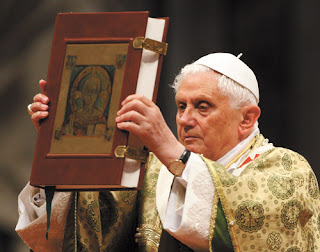The table of the word
39. As in every Eucharistic celebration, the Risen Lord is encountered in the Sunday assembly at the twofold table of the word and of the Bread of Life. The table of the word offers the same understanding of the history of salvation and especially of the Paschal Mystery which the Risen Jesus himself gave to his disciples: it is Christ who speaks, present as he is in his word "when Sacred Scripture is read in the Church".(60) At the table of the Bread of Life, the Risen Lord becomes really, substantially and enduringly present through the memorial of his Passion and Resurrection, and the Bread of Life is offered as a pledge of future glory. The Second Vatican Council recalled that "the Liturgy of the Word and the Liturgy of the Eucharist are so closely joined together that they form a single act of worship".(61)
The Council also urged that "the table of the word of God be more lavishly prepared for the faithful, opening to them more abundantly the treasures of the Bible".(62) It then decreed that, in Masses of Sunday and holy days of obligation, the homily should not be omitted except for serious reasons.(63) These timely decrees were faithfully embodied in the liturgical reform, about which Paul VI wrote, commenting upon the richer offering of biblical readings on Sunday and holy days: "All this has been decreed so as to foster more and more in the faithful 'that hunger for hearing the word of the Lord' (Am 8:11) which, under the guidance of the Holy Spirit, spurs the People of the New Covenant on towards the perfect unity of the Church".(64)
40. In considering the Sunday Eucharist more than thirty years after the Council, we need to assess how well the word of God is being proclaimed and how effectively the People of God have grown in knowledge and love of Sacred Scripture.(65) There are two aspects of this — that of celebrationand that of personal appropriation — and they are very closely related. At the level of celebration, the fact that the Council made it possible to proclaim the word of God in the language of the community taking part in the celebration must awaken a new sense of responsibility towards the word, allowing "the distinctive character of the sacred text" to shine forth "even in the mode of reading or singing".(66) At the level of personal appropriation, the hearing of the word of God proclaimed must be well prepared in the souls of the faithful by an apt knowledge of Scripture and, where pastorally possible, by special initiatives designed to deepen understanding of the biblical readings, particularly those used on Sundays and holy days.
If Christian individuals and families are not regularly drawing new life from the reading of the sacred text in a spirit of prayer and docility to the Church's interpretation,(67) then it is difficult for the liturgical proclamation of the word of God alone to produce the fruit we might expect. This is the value of initiatives in parish communities which bring together during the week those who take part in the Eucharist — priest, ministers and faithful(68) — in order to prepare the Sunday liturgy, reflecting beforehand upon the word of God which will be proclaimed. The objective sought here is that the entire celebration — praying, singing, listening, and not just the preaching — should express in some way the theme of the Sunday liturgy, so that all those taking part may be penetrated more powerfully by it. Clearly, much depends on those who exercise the ministry of the word. It is their duty to prepare the reflection on the word of the Lord by prayer and study of the sacred text, so that they may then express its contents faithfully and apply them to people's concerns and to their daily lives.



No comments:
Post a Comment
Please be respectful in your comments. Anonymous comments are no longer taken.